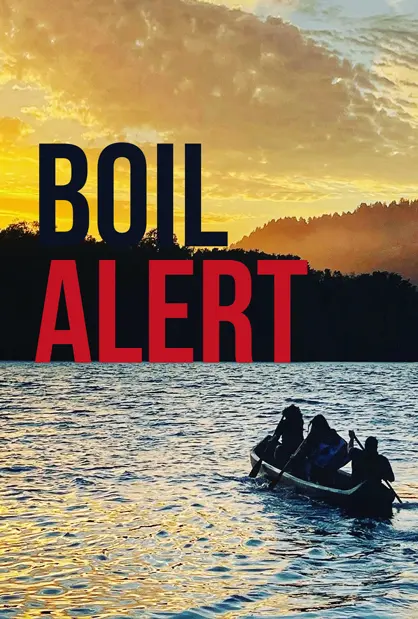Eye For Film >> Movies >> Boil Alert (2023) Film Review
Boil Alert
Reviewed by: Jennie Kermode

“My papa would say ‘One day water will be gold. Protect the water. Whoever has the water at the end, they’re going to be the ones surviving.’”
To Layla Staats of the Mohawk Turtle Clan, from the Six Nations of the Grand River, such memories are precious, in part because she was raised outside the reservation, in the town of Brantford, without access to her traditional culture. Parents sometimes think that this approach will help their children by making it easier for them to fit in with the dominant culture, and sometimes they’re right. In Layla’s case, however, it couldn’t erase awareness of difference and it just led to her feeling rootless. Her life became chaotic and dangerous as a result. Now, having married, straightened herself out and returned to the reservation, she has to walk the red road to reclaim her heritage and prove herself in the eyes of other Mohawk people. Focusing on water is key to her process of doing so.

Following Layla on her journey, this documentary by James Burns and Stevie Salas, the latter of whom is a member of the Apache nation, screened as part of the 2023 Toronto International Film Festival. It begins in the marshlands of Southern Ontario, an environment which may look empty to the untrained eye, but which is teeming with life. As the camera travels we see gradually more of the trees and plants and abundant life to be found there. Later, the camera will accompany Layla as she visits First Nations people in other communities who are battling to defend the ecosystems on which they depend and to access their basic right to clean water.
Wherever you are in the world, there’s a chance that you’re familiar with the scandal in Flint, Michigan, which began when water sources were contaminated in 2014 and took years to resolve (there are still a few people affected there today). It was a shocking situation and one which you might reasonably expect to have been a one-off, at least in terms of scale, but as this film quickly establishes, that is far from the case. Campaigners in Flint alleged that the issue was ignored at first because the city’s impoverished and majority Black population had little political leverage. Imagine, then, what happens to people living on reservations. Layla visits one whose residents are still having to get by on deliveries of bottled water after 27 years.
There are more. In Grassy Narrows, three generations of Ojibwe people have been poisoned as a result of the Reed paper mill allowing mercury to leak into their river throughout the Sixties and Seventies. Life expectancy has dropped. They have motor problems, sensory impairments and forgetfulness. The fish in the river have died, forcing them to abandon their traditional way of living. Despite all this, it is only comparatively recently that their predicament has been taken seriously by the outside world. For years they were written off, neurologists claiming that neurological problems developed in utero were a result of alcoholism and incest.
This isn’t the only type of pollution indigenous people have to deal with. Layla travels south to Navajo land laid waste by uranium mining whose consequences were never explained to them. Workers were given no safety instructions; kids played in the rubble. Some people, however, are endeavouring to prevent pollution before it occurs. Another Navajo woman discusses how she it a fire in the roadway to prevent access for vehicles which were needed to set up a coal burning power plant, keeping it going for years.
There were contrary opinions within the Navajo Nation in that case, but they are barely touched on here, leading one to wonder what else may have been left out. On the other hand, the filmmakers may have been wary of granting space to paid agents provocateurs, a known phenomenon. It could also be explained by the very personal nature of the film, which sees Layla wrestle with self doubt, especially when she and her husband come into conflict over her increasing radicalisation. He too is trying to walk the red road, but they may be going in different directions.
Stitching together the various pieces of Layla’s journey are sequences which use dance to explore wild landscapes, adding a different dimension to the film. They complement her efforts to interweave the political and the spiritual, to achieve a modern understanding of what it means to be a water protector. In the larger context of climate change, with rainfall patterns changing worldwide and numerous longstanding water sources drying up, it’s a role which every one of us should value.
Reviewed on: 10 Sep 2023

















